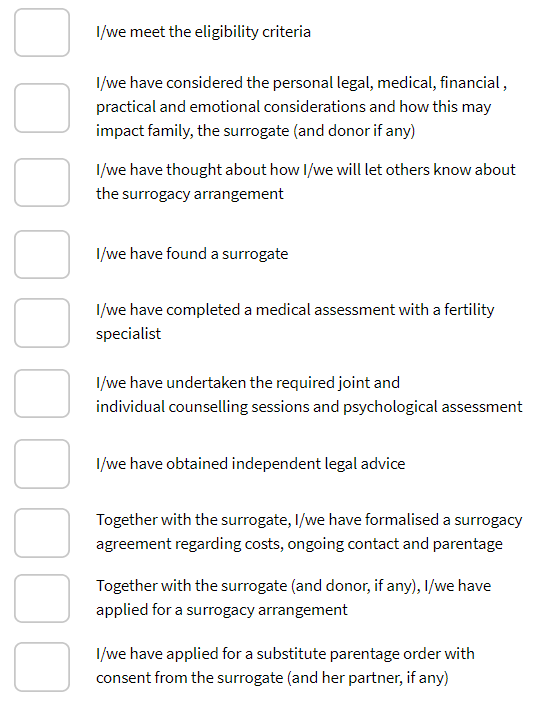Getting started - for intended parent(s)
Finding a surrogate
Finding a surrogate within Australia can seem impossible. It can be difficult to know where to start or who to ask for help. This information can help get you started. You can also contact a counsellor or fertility clinic for advice and support.
You should also consider:
- Letting family/friends know that surrogacy is your only option.
- Asking a family member or friend for help.
- Seeking a surrogate online through surrogacy support groups or online forums.
- It is illegal to publish an advertisement or notice, or attempt to publicly seek a surrogate. Fertility clinics cannot advertise on your behalf.
- You are not allowed to pay a surrogate other than prescribed costs.
- It is illegal for a surrogate to publicly indicate willingness to act as a surrogate.
Things to consider
Surrogacy arrangements have many financial, medical, practical and emotional implications for you, your family, and the child born from the arrangement. The laws affecting surrogacy vary across states and territories. You should always seek advice locally to take your individual circumstances into account.
It is normal to experience apprehension about needing help, as well as doubts and fear that the surrogate will want to keep the baby or will want to intrude or interfere with your family. In reality, few surrogates do not relinquish the child, with more cases of the intended parent(s) not wanting to take responsibility. In Victoria, the counselling sessions (joint and individual) aim to work through any concerns and potential issues, and ensure everyone is emotionally prepared.
Some of the things you should consider include:
- Giving yourself time and space to reconcile the grief and loss if you are not going to be genetically related to the child, or are not able to be pregnant and give birth.
- There are many avenues to become a parent. Is surrogacy the most comfortable option for you given your circumstances?
As with any successful relationship, it takes time to foster good communication, respect and trust between you and a surrogate. Given the complexity of surrogacy, ensure you take time to discuss potential issues and whether to proceed. A shared understanding of expectations and communication for the pregnancy, the birth plan, information exchange and any ongoing relationship with you and the child should be discussed. A surrogacy agreement formalises this and helps all parties clarify their wishes, expectations and responsibilities.
The following factors can contribute to a positive surrogacy arrangement:
- Stable mental and physical health, a positive life situation, and a supportive partner.
- Clear and open communication with clear boundaries and realistic expectations. This is particularly important if you have a pre-existing relationship with your surrogate (i.e. family member, friend).
- Trust your surrogate to do the right thing by herself, her body and your baby. Be genuine, respectful, open, reliable and have some degree of flexibility to work well together. Be supportive, build trust by keeping promises and show commitment (e.g. offer practical support, attend appointments, show interest in her health and wellbeing, listen).
- Understanding the medical process, success rates and timeframes.
- Realistic expectations surrounding emotional changes and reactions that may occur during the process. It is normal to feel anxiety, grief, guilt and disappointment. Be considerate of the potential strain a surrogate is putting on her personal relationships including her family by carrying your child.
- Agreeing on reasonable costs which will be reimbursed to the surrogate.
- Agreeing on a pregnancy and birth plan that all parties are comfortable with. Keep in mind that the birth mother has the right to manage her own pregnancy regardless of the agreement.
- Have common long-term goals about the rights and interests of the child and agreed openness about their conception and genetics.
- Be open to ongoing contact and communication in regards to the child. Children often need and like to know their origins.
Talking to your child
Whether a child is born with the help of a surrogate in Australia or a surrogate internationally, research and anecdotal evidence shows that children of surrogacy and donor conception benefit from being told how they came to be in the world. Children are also often curious to know more about their surrogate and donor (if any).
Find out more information about talking to children about how you became a family here.
Checklist for intended parent(s)

Helpful resources & support
Personal stories
Frequently Asked Questions
How many people have babies with the help of a surrogate in Victoria each year?
In 2017-18, 35 women received fertility treatment as surrogates in Victorian clinics, and 13 babies were born as part of surrogacy arrangements.

